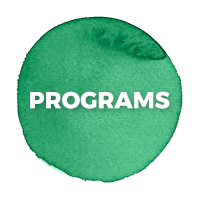Learner Pathways to Continuous Learning
ECALA has been such a wonderfully supportive partner and especially during the pandemic lockdown. ECALA’s incredible generosity was vital to allowing our staff to provide emergency services to people experiencing homelessness during the public health emergency. We have produced with our partner Homeward Trust a series of videos outlining experiences at the Expo Day Shelter. You can see the video if you click here. So, apart from our formal report, please pass along our warmest thanks to your coworkers. You all have made a huge difference.
Bissell Centre
One of the teachers, Mudumb, developed a website with a few lessons on different topics, including essential skills for the computer. The learners reviewed information on this website as a trial to practice what they learned in class. This approach has helped learners to improve their computer skills as well as learn language related to computer use. The experience encouraged them to enroll in our computer literacy program.
Canadian Arab Friendship Association, Reading and Language Proficiency
Many of our teachers in this program have experience or training in Task Based teaching and learning. They incorporate real materials in the classroom (nutrition labels, medicine bottles, alerts about internet and telephone scams, weather reports, newspaper articles about city and world issues, recipes, sales flyers, event posters, bus schedules, and forms that will achieve a result- such as qualifying for Leisure Access or Library cards), to ensure that learning the language has an immediate and practical use.
Edmonton Mennonite Centre for Newcomers, Seniors ELL
Many learners were happy with the learning and actually bought laptops or computers to ensure they continue to practice so that they don’t forget what they had learnt. Some learners, who did not have computers or could not buy computers, were encouraged to use the facilities provided by the libraries. They would go to the library and do the homework together, thereby learning by the help of each other.
Indo-Canadian Women’s Association, Computer Class

Working with Occupational Therapy Students from OCCTH 558 at the University of Alberta forty-eight students of programming at the main location were surveyed and 66% of them went to school in Canada and not another country for their education.
We shared this information with all Instructors to help them continue to understand the adult literacy students in their classes.
As research has shown, when programs are able to incorporate students’ experience and background knowledge into programming, it enables students to build on their prior knowledge and to make connections between familiar experiences and new ideas, while promoting growth in understanding and knowledge building. Therefore, to keep up with student trends it is important to always be evaluating and continuously evolving programming while asking:
- Are we supporting adult literacy students by building on their strengths?
- Are we providing the necessary scaffolding for success?
- Are we using the cultural and lived experiences of the diverse adult literacy students at TLCLA to enhance programming?
- Are the classroom environments safe places for adult literacy students to learn?
The Learning Centre Literacy Association, Learner Needs Assessment
Success Stories
Adult Literacy/Numeracy
A number of years ago, one participant had been assessed at a grade 2/3 writing/spelling level, and he was very ashamed of his low literacy. He struggled with the writing portion of the class activities and was not comfortable reading in front of the class. Mid-way through the program, after the tour at Norquest College he realized that there were programs out there for people like him, who struggled with learning. He felt comfortable to start talking about his struggles both one-on-one and with the group, and after the program was over, one of the facilitators accompanied him to The Learning Centre to connect him with resources to improve his reading, writing and math skills. He plans to work through some of the materials independently over the summer, and will pursue classroom style programming in the fall.
Facilitator
One father stated, “If I knew math could be so much fun, I would have done better in school.” When we began the program, he said he wasn’t good at math, and that he didn’t know how to teach it to his children. After attending the program only two weeks, he began to see numeracy as not a scary thing. He began to understand how much he does know and how he is and can continue teaching his son to build his numeracy skills. And that it isn’t all about math!
Facilitator
The students read Two Old Women, a story about two elderly women who learned late in life about courage and friendship. It was a motivating story for many of the seniors. While reading the story, two of the students gained confidence to step out of their comfort zone and they joined a community knitting program and an IPad program. A third senior crafted Christmas decorations to sell at her community centre. This in turn led to further discussions on neighbourhood community leagues in Edmonton and what programs and activities were of interest to all of the students. The three students who initially came to the program “to get out of the house” now had the confidence to attend other neighbourhood programs.
Facilitator
I tried not to think about reading before because I just wasn’t good at it. I would read things but skip over stuff and parts were difficult, especially big words. I’m a ward of the state and I needed help to read letters about important things that affected my life. My case worker brought me to the program. I was really nervous and afraid people would judge me or make fun of me.
Learner
When I came to book club it was weird to realize that everybody else had the same problem, and nobody laughed at you if you made a mistake. Everybody got corrected and they weren’t uncomfortable. It was because we were all there to learn. It was different from anything I ever saw before.
Learner
I’ve been in book club for 10 months. I am no longer afraid of reading out loud. My reading has improved. I can read letters and the paper. I love to cook and now I can follow recipes. I am proud of my reading and want to keep improving. I feel more confident about my whole life. I was able to speak up for myself in my court hearing and wasn’t shy or afraid.
Learner
One participant stopped preparing food for her family a long time ago. She thought she lost her cooking skills. During her first time in the class she helped prepare a recipe she thought she would never be able to cook. At the end of the class she was so excited and confident to cook for her family again. She loves having meals in the freezer, and her family has enjoyed all the new variety of meals.
Facilitator

English Language Learning
A Chilean Canadian who immigrated to Canada in 2009, enrolled in the ESL classes. Over the course of this ear 2017-2018, she eventually metamorphosed from a shy individual who was very conscious of her language impediment to a confident Canadian who openly shared her life’s journey with her peers amid laughter and tears.
She, along with her peers, was encouraged to speak up, not worrying about mistakes. With this confidence, came ease and, therewith, natural learning. The friendly environment of the class turned class fellows to friends. Together they learned about the Canadian culture, greeting each other, speaking about basic daily activities, going shopping, learning life skills and sharing family stories.
In January 2018, she happily announced to her instructor that she was accepted for a job from which she was previously rejected on the basis of lack of the ability to communicate in English. Watching her grow into a confident and independent woman only over the course of one year has been exceptionally rewarding.
Facilitator
I used to struggle with answering the very basic questions in English and now I am confident woman who can communicate emotions and I entered the Canadian workforce which is an extremely satisfying experience.
Learner
Basic Computers
When Dennis started in the beginner Computer Literacy class, he wasn’t comfortable with computers. He did typing practice while listening to YouTube videos and didn’t show much interest in learning other programs. After a while, he began to feel more confident, and started to use email, and word processing. He also became more active and engaged with other students.
He joined the advanced class, and was able to type up a resume. He became more confident in finding the information he wanted.
He gave up smoking in order to save up the money to buy his own laptop which he set up himself. Being able to practice what he learned. at home has really increased his confidence and self-esteem, and accelerated his learning. Now at class, he asks a lot of questions, and helps other students when he can. He recently bought his first smartphone. He will show other students how to do something with their phones. When he gets home from class, he teaches his mother what he learned.
Facilitator
Family Literacy
I listen to conversations at snack time where families are telling stories or talking about common struggles and sharing strategies – it all supports and models skills that are needed throughout life – communication, working together, problem solving, etc. Even though it is all based in oral language, the learning and building of community and support networks beyond just learning about language development is incredible and happens in every session.
Facilitator
In this program, I love that parents come because of their desire to support their child, but during the session, they are doing so much more learning for themselves – sometimes they don’t even realize it because they are so focused on their child.
Facilitator
Community Capacity Building
When I first started the program, I wanted to learn more about how children grow and develop. I know Canadians raise their children differently. It is good to know because I am new to the country. I started trying what I was learning with my children. In class I talked about how things were working or not. So many good ideas. I feel that I am better and know children better. My family is better.
Learner




